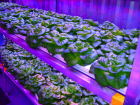
Nov. 8, 2017, Ottawa – If you’ve visited or lived in a remote community in Canada, chances are you weren’t there for the salad.
In many regions that are far from traditional food production systems, fresh vegetables are inconsistent and costly due to the distance and effort required to get them there.
Now, an Ottawa-based company with a focus on food access is helping remote communities grow fresh vegetables 365 days a year, thanks to Containerized Growing Systems.
“We knew that any food production system we developed for the arctic and remote regions would need to be easily dropped in communities that lack road access, and it would have to be ready to use, without relying on skilled tradespeople,” says Ellis.
WORKING WITH VERTICAL HARVEST HYDROPONICS
Thanks to a partnership with U.S.-based Vertical Harvest Hydroponics, The Growcer provides shipping containers set up with vertical hydroponics growing systems.
Each system has the capacity to produce approximately 12,000 pounds of fresh produce – that’s enough for five servings of vegetables for 100 people per day. And the systems are designed to be modular: operators can grow their business incrementally, reinvesting profits as demand is generated.
“As a social enterprise, The Growcer team has a strong interest in bringing value to the communities we serve,” says Ellis. “We write a business plan with them, we do a full market assessment to help them understand what people are eating, and we work with them to determine what they might grow at different price points.”
The Growcer team members also travel to communities to provide training. To date, the company has established projects in a variety of regions, from Churchill, Manitoba, to Iqaluit, Nunavut.
“The people who are making decisions about what they should be growing are in the community, and that allows for a quicker and better response to each community’s food issues,” Ellis says.
SOCIAL AND COMMUNITY DEVELOPMENT
He notes The Growcer continues to measure and make decisions based on social and community development. The company was founded while Ellis and his co-founder Alida Burke were students working on a project in Nunavut, with the help of Startup Garage, a business incubator program at the University of Ottawa where Ellis will soon graduate.
As businesses continue to grow, he sees opportunities for individual communities to expand operations, and provide more value-added products and local employment opportunities through food processing, all led by local entrepreneurs.
This article is provided by AgInnovation Ontario, a project of the Agri-Technology Commercialization Centre (ATCC). The ATCC is funded by Growing Forward 2, a federal-provincial-territorial initiative. For more information: info@aginnovationontario.ca
Print this page


